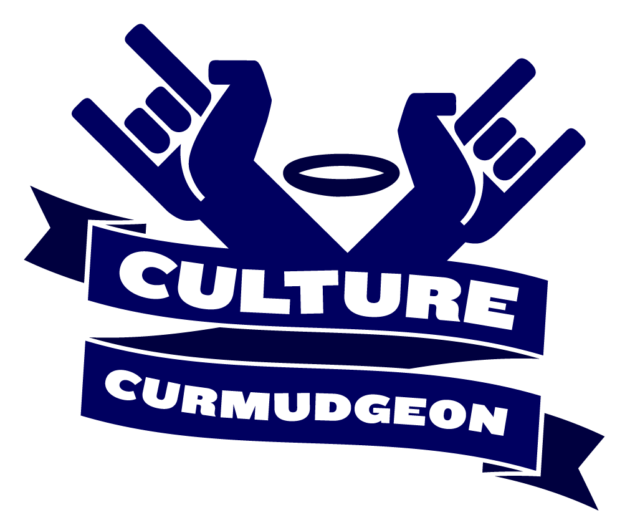The grainy black and white images of George H.W. Bush are eerily familiar when they’re first projected onto the wall. The audio system blares out pink noise to jolt the audience out of their pre-play stupor.
We’ve all seen this video before. It’s from one of the darkest eras of U.S. history. Soon enough, you see smoke billowing out of two towers of the World Trade Center after two passenger planes hijacked by Saudi extremists smashed into them on the morning of September 11, 2001. The wars in Afghanistan and Iraq would break out a few weeks after that. The rest, they say, is history.
Ahmad Coo is a producer and copy editor for the Global Business America show on CCTV America. His analysis represents his views alone.
We now know that the justification for those wars, specifically the Iraq conflict, never existed — that Iraqi dictator Saddam Hussein allegedly had weapons of mass destruction.
“Intelligence,” is now playing at Arena Stage in Washington, D.C., focuses its fire on that deception and how the Bush White House put blinders on the American public with the complicity of the press. Though the story behind the play is well known- it’s been given a new urgency thanks to Jacqueline Lawton’s taut and urgent writing.
At the center of the political maelstrom was CIA operative Valerie Plame, played by Hannah Yelland.
Plame is the production’s fulcrum — and the unwitting catalyst that triggered the conflagration that’s still burning in Iraq and Syria. For most of the play, Plame is scrambling to look for evidence of Saddam’s weapons of mass destruction program.
At that time the neoconservatives believed that while Osama bin Laden may have bankrolled the hijackers, the Iraqi president was the nexus of what Bush had dubbed the “axis of evil”. A wayward Saudi billionaire may have been responsible for 9/11, but that attack along with every perceived evil act by Middle Eastern elements is rooted in Saddam Hussein’s dictatorship.
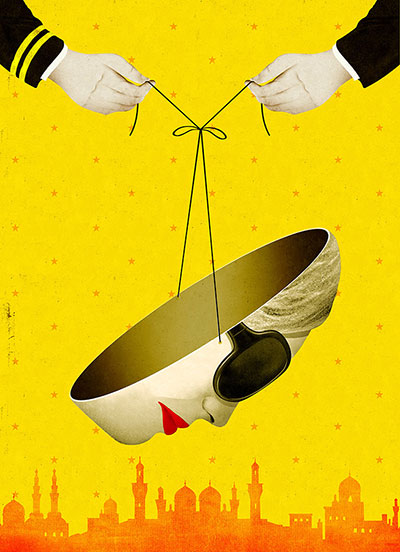
Play illustration by Brian Stauffer.
So in the post 9/11 world, especially in America, everyone in government was arguably looking for revenge.
The Bush administration was ostensibly looking to secure the U.S. mainland after suffering the worst national trauma since World War II. But how did the government go from blaming Osama Bin Laden for masterminding the New York attacks to suspecting Iraq’s involvement?
To this day, it’s still not clear how that shift happened. There are theories, but according to some reports Bush had instructed his counter-terrorism team to investigate Iraq’s involvement a day after the 9/11 attacks.
Barely a week later, Bush had made up his mind that Saddam had something to do with it without presenting any evidence. According to Bush speechwriter David Frum’s memoir “The Right Man”, his boss told him to come up with a justification for war against Iraq for the State of the Union Speech that year.
This obfuscation and the resulting confusion is very much present in “Intelligence”.

(L to R) Ethan Hova as Dr. Malik Nazari and Hannah Yelland as Valerie Plame in Intelligence at Arena Stage at the Mead Center for American Theater, running February 24-April 9, 2017. Photo by C. Stanley Photography.
That Bush decision set in motion a series of events that assumed a life and velocity of its own, with a shadowy hand guiding the country towards war. Now that Bush had already decided who would be punished, there was little anyone could do to stop the inevitability of an invasion of Iraq.
The play’s tragic heroine had no idea that was the case and believed that her evidence-gathering mission would play a crucial role in deciding if the United States would go to war.
Nothing could have been farther from the truth.
Plame and all the characters in the play were nothing more than pawns in the Bush administration’s maneuvering to justify a war against Iraq. Still Plame believed in her mission and hoped the government had enough integrity to prove her suspicions wrong. Soon we find Plame and her informants and sources caught in a vortex of politics and intrigue.
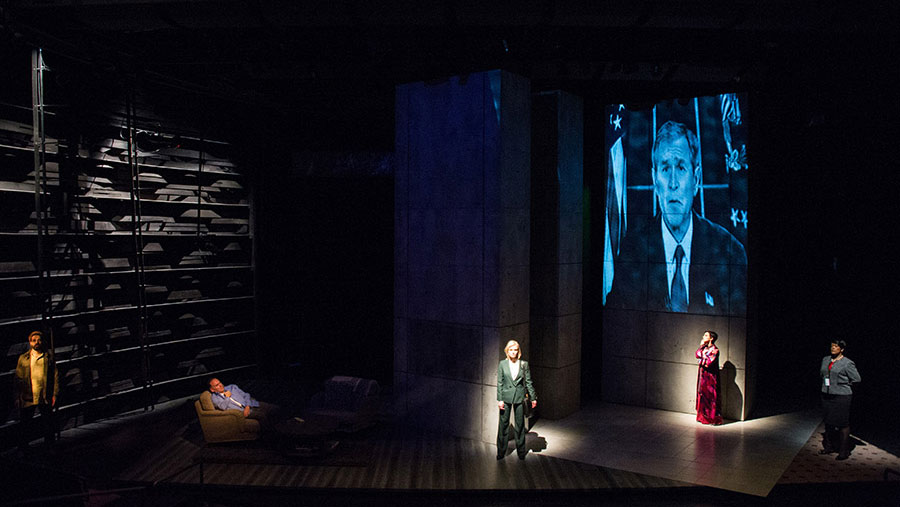
(L to R) Ethan Hova as Dr. Malik Nazari, Lawrence Redmond as Joseph Wilson, Hannah Yelland as Valerie Plame, Nora Achrati as Leyla Nazari and Aakhu TuahNera Freeman as Elaine Matthews in Intelligence at Arena Stage at the Mead Center for American Theater, running February 24-April 9, 2017. Photo by C. Stanley Photography.
Eventually Plame is forced to betray her friends and informants — all in the name of democracy and to protect the American public from further terrorist attacks. In the play, we see the moral dilemma Plame is wrestling with as she tries to give the Central Intelligence Agency the evidence it needs to prove Saddam has WMDs — and at the same time ensure the safety of her contacts.
She would fail spectacularly at both. Soon after — and the play begins to hit its stride at this point — Plame’s life and career begin to unravel at alarming speed.
At the same time, the government’s carefully constructed lie to justify the Iraq War starts to collapse unto itself — thanks to Plame’s husband Joseph Wilson, a journalist and former diplomat stationed in Iraq.
Having access to information about Africa and the Middle East, Wilson had suspected that the Bush administration’s claim that Iraq had mined uranium had come from a debunked British intelligence report that had somehow been used as evidence to prove Saddam wanted to develop weapons of mass destruction.
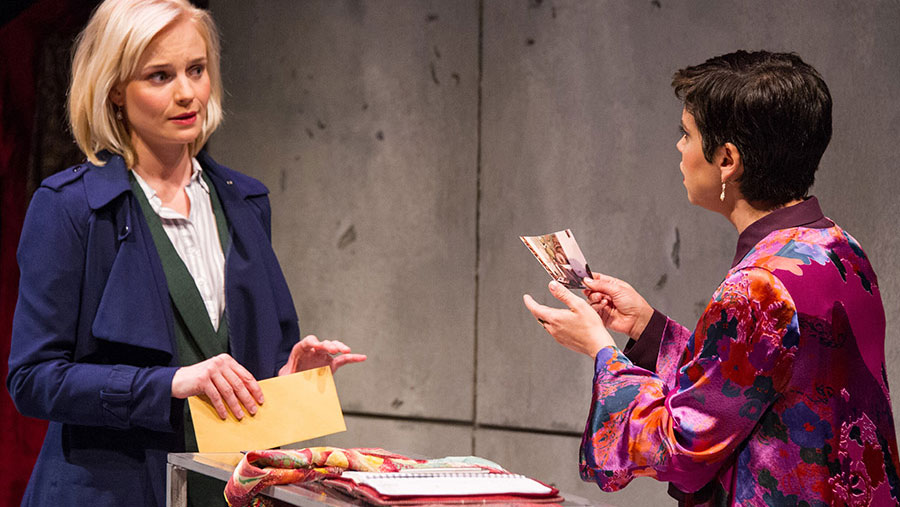
(L to R) Hannah Yelland as Valerie Plame and Nora Achrati as Leyla Nazari in Intelligence at Arena Stage at the Mead Center for American Theater, running February 24-April 9, 2017. Photo by C. Stanley Photography.
His decision to publish an op-ed in the New York Times divulging his knowledge of the situation would ultimately reveal that the emperor had no clothes.
Thanks to Wilson’s extravaganza, everyone saw Bush’s justification for invading Iraq for what it was: an outright brazen lie.
As the play picked up speed, I found myself getting more anxious and angrier with every scene.
“Intelligence” reminded me of the deception and the hundreds of thousands of people who have died because of one man’s lie. That same lie continues to reverberate through the Middle East today.
It may be an oversimplification here, but I believe the Trump administration’s insistence that Obama’s scale down of U.S. operations in Iraq and Afghanistan led to the creation of ISIL is misguided.
If anyone deserves more blame for the rise of ISIL, it’s George II. He’s the one who removed Saddam Hussein, whose death led to a political vacuum that eventually resulted in what could arguably be considered the failed state Iraq is today.
I’m still mystified as to why no one has taken George H.W. Bush and his cohorts to task over his lie to start the Iraq war. But then I remember that I’m living in the age of Trump, where the truth doesn’t matter anymore.
If there’s anything “Intelligence” is blazingly successful at — it’s calling attention to the absurd ‘alternative’ reality we now live in.
 CGTN America
CGTN America
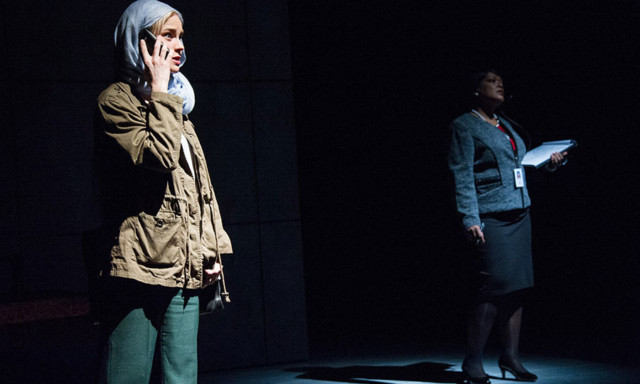 (L to R) Hannah Yelland as Valerie Plame and Aakhu TuahNera Freeman as Elaine Matthews in Intelligence at Arena Stage at the Mead Center for American Theater, running February 24-April 9, 2017. Photo by C. Stanley Photography.
(L to R) Hannah Yelland as Valerie Plame and Aakhu TuahNera Freeman as Elaine Matthews in Intelligence at Arena Stage at the Mead Center for American Theater, running February 24-April 9, 2017. Photo by C. Stanley Photography.
